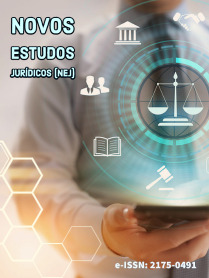ARTIFICIAL INTELLIGENCE AND INTERNATIONAL ARBITRATION
DOI:
https://doi.org/10.14210/nej.v27n2.p258-281Palavras-chave:
Direito, Inteligência Artificial, Arbitragem InternacionalResumo
Contextualização: Durante os primeiros dias da pesquisa em inteligência artificial, cientistas da computação tentaram criar algoritmos que imitassem a inteligência humana, tentando compreender e recriar processos cognitivos humanos.
Objetivos: Este artigo examina se e como a inteligência artificial pode ser utilizada para auxiliar ou até mesmo substituir os árbitros em seu papel de resolver disputas. Notavelmente, este artigo não trata da arbitragem, que se refere a procedimentos em que os processos são simplificados pelo uso de tecnologia, como arquivamentos eletrônicos, mas onde árbitros humanos continuam a tomar decisões.
Metodologia: A pesquisa utiliza o método indutivo e revisão de literatura.
Resultado: A arbitragem internacional, sempre criticada por ser excessivamente cara e demorada, deve levar a sério a afirmação feita por certos desenvolvedores de inteligência artificial de que os computadores podem realizar o trabalho de 360.000 advogados. Mais estudos são necessários para determinar a técnica ideal para misturar os tomadores de decisão humanos com a inteligência artificial para obter os resultados mais eficientes.
Downloads
Referências
ALETRAS, Nikolaos et al. Predicting Judicial Decisions of the European Court of Human Rights: A Natural Language Processing
Perspective, PeerJ Computer Science 2:e93 (2016). DOI: https://doi.org/10.7717/peerj-cs.93
ALVAREZ, Gloria Maria et al., A Response to the Criticism Against ISDS by EFILA, 33(1) J. Int’l Arb. 1, 4 (2016). DOI: https://doi.org/10.54648/JOIA2016001
AMBROGI, Robert J. et al. Ethics Issues in Lawyers’ Use of Artificial Intelligence, presentation at 44th ABA National Conference on
Professional Responsibility (1 June 2018). DOI: https://doi.org/10.1007/978-3-319-23514-1_158-1
APOSTOLOVA, Kate; KUNG, Mike. Don’t Fear AI in IA, Global Arb. Rev. (27 Apr. 2018);.
BELLO, Adesina Temitayo. Online Dispute Resolution Algorithm: The Artificial Intelligence Model as a Pinnacle, 84(2) Int’l J. Arb.
Mediation & Dispute Mgmt. 159 (2018).
BODEN, Margaret A. Artificial Intelligence: A Very Short Introduction 26–28 (Oxford University Press 2018). DOI: https://doi.org/10.1093/actrade/9780199602919.001.0001
CASEY, Bryan; FARHANGI, Ashkon; VOGL, Roland. Rethinking Explainable Machines: The GDPR’s ‘Right to Explanation’ Debate
and the Rise of Algorithmic Audits in Enterprise, 34:1 Berkeley Tech. L.J. 143 (2019).
CITRON, Danielle Keats; PASQUALE, Frank. The Scored Society: Due Process for Automated Predictions, 89 Wash. L. Rev. 1 (2014).
COHEN, Paul Cohen; NAPPERT, Sophie. The March of the Robots, Global Arb. Rev. (15 Feb. 2017).
CORTÉS, Pablo; COLE, Tony. Legislating for an Effective and Legitimate System of Online Consumer Arbitration, in Arbitration in the
Digital Age, n. 5, at 2009.
DEDEO, Simon. Wrong Side of the Tracks: Big Data and Protected Categories (2015), https://arxiv.org/pdf/1412.4643v2.pdf (accessed
April 2022)
DEVINS, Neal; BRAUM, Lawrence. Split Definitive: How Party Polarization Turned the Supreme Court into a Partisan Court, 2016 DOI: https://doi.org/10.1086/691096
Sup. Ct. Rev. 301, 331 (2016).
EBERHARDT, Pia, et al. Profiting from Injustice: HowLawFirms, Arbitrators and Financiers Are Fuelling an Investment Arbitration
Boom 8 (Corporate Europe Observatory 2012).
FLACH, Peter. Machine Learning: The Art and Science of Algorithms that Make Sense of Data 2 (Cambridge University Press 2012). DOI: https://doi.org/10.1017/CBO9780511973000
FRANCK, Susan D. et al. Inside the Arbitrator’s Mind, 66 Emory L.J. 1115 (2017).
GUIMERA, Roger; SALES-PRADO, Marta. Justice Blocks and Predictability of U.S. Supreme Court Votes, 6(11) PloS One (2011). DOI: https://doi.org/10.1371/journal.pone.0027188
GUTHRIE, Chris; RACHLINSKI; Jeffrey; WISTRICH, Andrew J. Inside the Judicial Mind, 86 Cornell L. Rev. 777 (2001). DOI: https://doi.org/10.2139/ssrn.257634
HANKE, Philip. Computers with Law Degrees? The Role of Artificial Intelligence in Transnational Dispute Resolution, and Its
Implications of the Legal Profession, 14(2) Transnat’l Disp. Mgmt. 1 (2017).
JETTEN, Lieke; SHARON, Stephen. Selected Issues Concerning the Ethical Use of Big Data Health Analytics 72 Wash. & Lee L. Rev.
Online 486, 487 (2016).
JOLLS, Christine; SUNSTEIN, Cass; THALER, Richard. A Behavioral Approach to Lawand Economics, 50 Stan. L. Rev. 1471 (1998); DOI: https://doi.org/10.2307/1229304
Avishalom Tor, The Methodology of the Behavioral Analysis of Law, 4 Haifa L. Rev. 237 (2008).
KAHNEMAN, Daniel; TVERSKY Amos. Subjective Probability: A Judgment of Representativeness, 3 Cognitive Psychol. 430, 431 DOI: https://doi.org/10.1016/0010-0285(72)90016-3
(1972).
KASPAROV, Gary. Deep Thinking: Where Machine Intelligence Ends and Human Creativity Begins (John Murray 2017).
KATZ, Daniel M.; BOMMARITO, Michael J.; BLACKMAN, Josh. A General Approach for Predicting the Behavior of the Supreme
Court of the United States, 12(4) PloS One (2017).
KOSINSKI, Michal; WANG, Yilun. Deep Neural Networks Are More Accurate than Humans at Detecting Sexual Orientation from
Facial Images, 114 J. Personality & Soc. Psychol. 246 (2018). DOI: https://doi.org/10.1037/pspa0000098
LAURITSEN, Marc. Towards a Phenomenology of Machine-Assisted Legal Work, 1(2) J. Robotics, Artificial Intelligence & L. 67, 79
(2018).
LEGG, Shane; HUTTER, Marcus. A Collection of Definitions of Intelligence, 157 Frontiers in Artificial Intelligence & Applications 17
(2007).
LOHMAN, David F. Human Intelligence: An Introduction to Advances in Theory and Research, 59(4) Rev. Educational Res. 333 (1989). DOI: https://doi.org/10.3102/00346543059004333
MACCORMICK, Neil. Legal Reasoning and Legal Theory x (Oxford Clarendon 1977).
MADSEN, Mathias Winther. The Limits of Machine Translation 5–15 (2009) Master Thesis University of Copenhagen, http://vantagesiam.com/upload/casestudies/file/file-139694565.pdf, cited in Harry Surden, Machine Learning and the Law, 89 Wash. L. Rev. 87, 99
(2014).
MARTIN, Andrew D., et al. Competing Approaches to Predicting Supreme Court Decision Making, 2(4) Persp. Pol. 761 (2004). DOI: https://doi.org/10.1017/S1537592704040502
RUGER, Theodore W., et al. The Supreme Court Forecasting Project: Legal and Political Sciences Approaches to Predicting Supreme
Court Decision making, 104 Colum. L. Rev. 1150 (2004). DOI: https://doi.org/10.2307/4099370
MARTIN, Emma. The Use of Technology in International Arbitration, in 40 Under 40 International Arbitration 337–48 (Carlos
Gonzalez-Bueno ed., Wolters Kluwer 2018).
MCCARTHY, John, et al. A Proposal for the Dartmouth Summer Research Project on Artificial Intelligence (31 Aug. 1955), in Artificial
Intelligence: What Everyone Needs to Know1 (Jerry Kaplan ed., Oxford University Press 2016), wwwformal.stanford.edu/jmc/history/dartmouth/dartmouth.html (accessed 15 April 2022).
MILLER, Tim. Explanation in Artificial Intelligence: Insights from the Social Sciences, 267 Artificial Intelligence 1, at 17–18, 20 (2019). DOI: https://doi.org/10.1016/j.artint.2018.07.007
NAPPERT, Sophie. Disruption Is the NewBlack – Practical Thoughts on Keeping International Arbitration on Trend, (2) ICC Dispute
Resolution Bulletin 20, 25–36 (2018). DOI: https://doi.org/10.14321/fourthgenre.20.1.0025
PAISLEY, Kathleen; SUSSMAN, Edna Sussman. Artificial Intelligence Challenges and Opportunities for International Arbitration,
(1) NYSBA New York Dispute Resolution Lawyer 35 (Spring 2018).
RADIN, Max. The Theory of Judicial Decision: Or HowJudges Think, 11 ABA J. 357, 362 (1925).
SCHERER, Maxi. International Arbitration 3.0 – HowArtificial Intelligence Will Change Dispute Resolution, Austrian Y.B. Int’l Arb.
(2019).
SCHMITZ, Amy J. Building on OArb Attributes in Pursuit of Justice, in Arbitration in the Digital Age 182 (Maud Piers & Christian DOI: https://doi.org/10.1017/9781108283670.011
Aschauer eds, Cambridge University Press 2018).
SIM, Christine. Will Artificial Intelligence Take over Arbitration?, 14(1) Asian Int’l Arb. J. 1 (2018). DOI: https://doi.org/10.54648/AIAJ2018001
SMIT, Robert H. The Future of Science and Technology in International Arbitration: The Next Thirty Years, in The Evolution and Future
of International Arbitration 365–78 (Wolters Kluwer 2016).
SUSSKIND, Richard. Tomorrow’s Lawyers: An Introduction to Your Future (2d ed., Oxford University Press 2017).
SUSSMAN, Edna. Biases and Heuristics in Arbitrator Decision-Making: Reflections on Howto Counteract or Play to Them, in The Roles
of Psychology in International Arbitration (Tony Cole ed., Wolters Kluwer 2017).
TEGMARK, Max. Life 3.0: Being Human in the Age of Artificial Intelligence, 24 et seq. (Knopf 2017).
TVERSKY, Amos; KAHNEMAN, Daniel. Judgment Under Uncertainty: Heuristics and Biases, 185 Science 1124 (1974). DOI: https://doi.org/10.1126/science.185.4157.1124
UNCTAD, Investor-State Dispute Settlement: Reviewof Developments in 2016 1 (May 2017); UNCTAD, Investor-State Dispute
Settlement: Reviewof Developments in 2017 1 (June 2018).
URBAN SOARES, Francisco. New Technologies and Arbitration, VII(1) Indian J. Arb. L. 84 (2018).
VANNIEUWENHUYSE, Gauthier. Arbitration and New Technologies: Mutual Benefits, 35 J. Int’l Arb. 119–29 (2018). DOI: https://doi.org/10.54648/JOIA2018005
WAHAB, Mohamad S. Abdel. Online Arbitration: Traditional Conceptions and Innovative Trends, in International Arbitration: The
Coming of a New Age? ICCA Congress Series 17, 654–67 (Albert Jan van den Berg ed., Wolters Kluwer 2013).
Downloads
Publicado
Como Citar
Edição
Seção
Licença
Na qualidade de autor(es) da colaboração, original e inédita, sobre o qual me(nos) responsabilizo(amos) civil e penalmente pelo seu conteúdo, após ter lido as diretrizes para autores, concordado(amos) plenamente com as Políticas Editorias da Revista Novos Estudos Jurídicos - NEJ e autorizo(amos) a publicação na rede mundial de computadores (Internet), permitindo, também, que sua linguagem possa ser reformulada, caso seja necessário, sem que me(nos) seja devido qualquer pagamento a título de direitos autorais, podendo qualquer interessado acessá-lo e/ou reproduzi-lo mediante download, desde que a reprodução e/ou publicação obedeçam as normas da ABNT e tenham a finalidade exclusiva de uso por quem a consulta a título de divulgação da produção acadêmico científico.





























